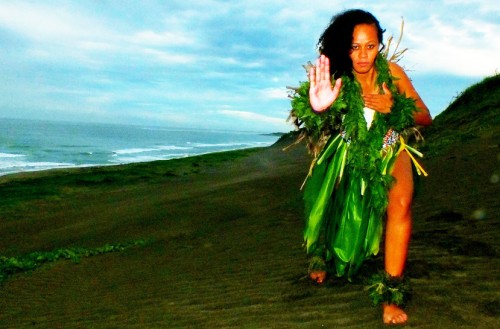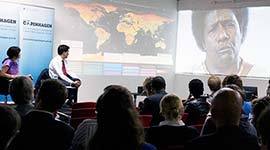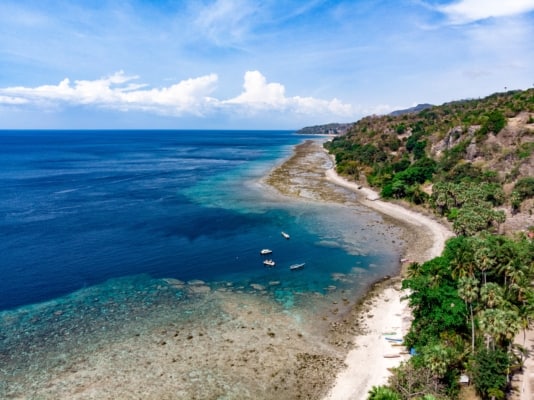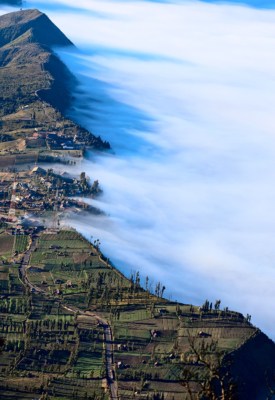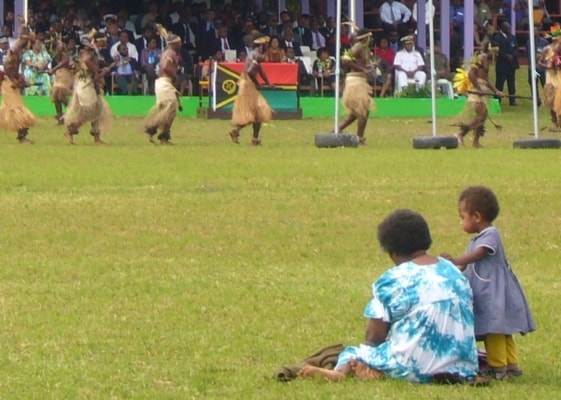Image: 350.org’s Fiji Warriors campaign: ‘We are not drowning. We are fighting.’
Beyond ‘adaptability’? In this guest post, Nicole George highlights the work of women leaders who are challenging a narrow adaptation agenda.
Land is Life, shot in Kiribati and Tuvalu, is a series of short films by Rodney Dekker for Oxfam Australia about the effects of climate change on the islands of the Pacific.
These films depict women’s and men’s responses to climate change in quite specific ways. Local male politicians, bureaucrats and community leaders are encouraged to ruminate in a detached fashion – behind desks, in offices, in front of computers – on the risks posed to their populations.
Women’s authority is presented, rather, as that of first-hand witnesses, who testify how the invading sea has disrupted their cultivating, fishing or caring roles. Women shed many tears in these films as they reflect on the fate of their children.
Sometimes the mood is a little more upbeat when these stories are complemented with those demonstrating women’s adaptability; their efforts to develop new cultivation methods, new fishing practices, or their involvement in coastal regeneration projects such as mangrove nurseries. Among the images that depict women at the heart of family and community life, viewers are also encouraged to reflect on their resilience and their capacity for adaptation to new environmental security challenges.
There is a similar focus on adaptation to climate change in the regional aid and development sector. The Secretariat of the Pacific Community has recently developed a toolkit on how gender mainstreaming should figure in climate change adaptation projects. This might give women the necessary decision-making opportunities, material resources and practical knowledge to become agents who can play key roles in assisting and developing community adaptation to environmental insecurity, if given the chance.
But we might also ask, in a more provocative vein, what’s left out of the picture when the focus is so consistently placed on the adaptability of Pacific Islanders? Helping them adapt may make neighbouring countries feel like they are taking some responsibility on this issue. But it would be just as productive, when debating women’s security in this region, if Pacific Rim countries also considered how they too might more effectively adapt their own policy responses to this issue.
Women activists from across the islands have developed a sophisticated and eloquent language that seeks to make the region’s powers understand how their own actions have increased the threats posed to their communities by climate change.
Ursula Rakova, from the Carteret Islands in Papua New Guinea, is the leader of one of the first Pacific island communities to lose territory to seawater inundation. She has overseen her community’s forced migration to Bougainville – a territory already in long-term transition from conflict, making the security of this incoming population fragile.
Rakova describes climate change as “the central poverty issue of our time, where we see the world’s most vulnerable facing greater droughts, floods, hunger and disease, despite being the least responsible for causing climate change”.
Similar resistance is voiced by Noelene Nabulivou from Fiji, a long-time, renowned campaigner who demands greater accountability on gender and environmental security from Pacific Rim ‘big brother’ countries. The Pacific Rim states – all major carbon-emitting nations eager to protect their economic security – have been accused of an ‘aggressive backtracking‘ on their ‘commitments to climate action and financing’.
In these debates, Nabulivou has argued (pdf, 86 KB) that gender security can only be achieved when Pacific Rim nations show a willingness to create “ambitious and legally binding climate change mitigation commitments”.
This is an awkward and contentious politics for the major powers in the Pacific Islands. They are undoubtedly more comfortable with images of Pacific women in Tuvalu, Marshall Islands or Kiribati who demonstrate a quiet and dignified adaptability to the environmental dangers that lie before them, than women who express anger and fear about their future insecurity and lay the blame for this at their door.
As sea level rise continues, climate change adaptation, as it is currently practiced in the Pacific Islands, tinkers at the edge of the problem. Without Pacific Rim countries’ accompanying commitments to carbon emission reduction, it simply waters down women’s security.

